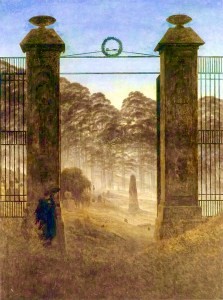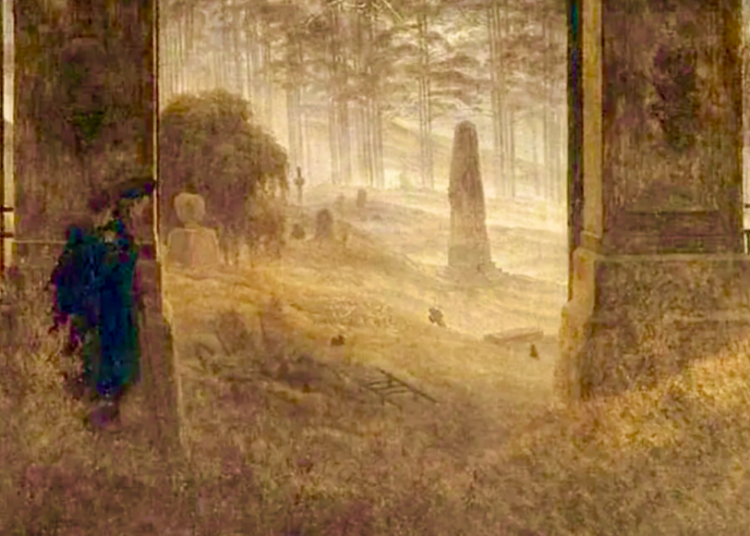My friend John O’Connell was a conservative of the truest stamp, never miseducated, never subject to the whims and fashions of opinion. A man of dignified piety, his principles were strong and unshakable. I have had occasion many times to say that Jack was the best man I knew, and I do not want his name to be forgotten.
 Last semester, when I was teaching the Iliad to freshmen at Wyoming Catholic College, we came upon some extensive lists of names, probably in the catalog of ships in Book II, but maybe later in the poem when Diomedes kills many Trojans or Hector kills many Achaians. Homer often gives the names of those killed, even a brief biography — a glimpse of the man’s home beside a river, his flourishing orchards, the young bride who would mourn him. I had occasion to say of these men who had been reduced to a single attribute or a bare name that at least they had made it into the poem. No matter how small their significance 3000 years ago, a trace of them remained.
Last semester, when I was teaching the Iliad to freshmen at Wyoming Catholic College, we came upon some extensive lists of names, probably in the catalog of ships in Book II, but maybe later in the poem when Diomedes kills many Trojans or Hector kills many Achaians. Homer often gives the names of those killed, even a brief biography — a glimpse of the man’s home beside a river, his flourishing orchards, the young bride who would mourn him. I had occasion to say of these men who had been reduced to a single attribute or a bare name that at least they had made it into the poem. No matter how small their significance 3000 years ago, a trace of them remained.
This point evoked a mild response at best. But when I asked the freshmen how many of them knew the names of their great-grandparents, their faces changed. Only a few did. Did they know of any incident or episode in the lives of those who had preceded them by 100 or 150 years — any single vivid moment out of these whole lives of 60 or 70 or 80 years, lives that had surely been full of events and emotions? No, they did not. So, by projection forward, what would their own lives be to their great-grandchildren? In this context, being named at all — in one of the genealogies in the Old Testament, say, or in the lists of the Iliad — began to gain a little more purchase on their imaginations. In terms of this mortal life and a place in living memory, recognition is a rare thing.
I had occasion to remember this conversation with the students just after Christmas when my wife and I learned that our youngest daughter’s godfather, John O’Connell, had died in April. No one had told us. No one knew to tell us. We had been gone for over 25 years from Nashua, New Hampshire, where we had known Jack and his wife Janet.
My wife Virginia and I first met Jack at Thomas More College in Merrimack, New Hampshire, where we taught in the 1980s and 1990s. He was a volunteer in charge of work-study, and he brought to the task his experience as an enlisted Navy man who had ended his 30-year career as Master Chief Petty Officer. He was eminently practical and no-nonsense with the students, who were sometimes taken aback at the tasks he expected of them (say, after a two-foot snowfall), but gruff as he was, he was also full of humor, and he had great respect for the education they were receiving.
Always, even the last time I saw him, he would tell the story of how nervous he and his wife Janet were when my wife and I first had them over to dinner. “Two PhD’s—and we never even went to college!” he would say. “What were we going to talk about?” It turned out that we had plenty to talk about. He and Janet were in their late 50s at the time, and they were an unforgettable couple. Janet was a Polish girl with a raspy, cigarette-roughened voice, one of those tough nurses you hope is around when someone you love is actually in trouble. She and Jack married in 1953, and we used to hear stories the social intricacies of their Navy years in Japan or the challenges of the Aleutian Islands. In the succeeding years, they had us over many times, as we had them over. I remember Jack’s flourishing garden, his many stories, his soberly virtuous way of handling situations and offering his help.
When we first went to New Hampshire in 1986, it was still a bastion of conservatism, very much unlike that state today (despite all the hoopla over the primary), and Jack was a deeply engaged citizen who supported conservative causes and got to know the senators and representatives. He was a conservative of the truest stamp, never miseducated, never subject to the whims and fashions of opinion. A devout Catholic, he was a man of dignified piety, and his principles were strong and unshakable. I have had occasion many times to say that Jack was the best man I knew, and I do not want his name to be forgotten. On the “Tribute Wall” where his obituary is posted, only four of his recent acquaintances at the retirement home have anything to say, all of it about knowing him at Ledgewood in the last few years of his life. But there is nothing about this remarkable, ordinary man with his great, unpretentious heart and his spirited devotion to God and his country.
Jack and Janet became an important part of our family life, and when our daughter Monica was born in 1992, it was our honor that they agreed to be the godparents; they were already surrogate grandparents to our other seven children, whose real grandparents were far away in Georgia and Chicago. Sadly, Jack and Janet had no grandchildren of their own. Back in December, when we told our children about Jack’s death, all of the older daughters remembered that Jack and Janet had shown them the movie Brigadoon—why that movie? they wondered—when they all stayed at the O’Connells’ house in Milford, New Hampshire. We’ll have to watch it again.
Janet died in 2008, which broke Jack’s heart, but he endured. We kept in touch. We saw him several times during our years at Assumption College in Worcester, Massachusetts, but since we have been in Wyoming, our correspondence had dwindled to Christmas greetings or calls on his birthday (today would have been his 97th). I last saw him in October of 2021 when I gave a lecture on the Odyssey at Thomas Aquinas College East in Northfield, Massachusetts. It was just an hour to John’s retirement home in Milford, New Hampshire, and I drove up with my friend, Scott Tygett. We took Jack to lunch, and I remember his undiminished hearty laugh at 94. He always asked about our children. He discounted his many afflictions and gave only the briefest narratives of the medical emergencies that had often hospitalized him for a month or more.
Jack once told me that you knew you had really left the Navy when you were carrying an oar and someone mistook it for—something, and I kick myself that I don’t remember what modern implement it was. I probably erased the comparison from memory because it was “a winnowing fan” in the Odyssey, where this identical scenario turns up in Teiresias’ directive to Odysseus: carry an oar so far inland that someone will ask why you are carrying that winnowing fan, whereupon you plant the oar in the ground and sacrifice to Poseidon. Jack did not know Homer at all, and he did not mean to make an allusion, just to repeat a Navy saying. But it was a glimpse of the tradition reaching back over the millennia, when men like Jack O’Connell have always stood for what is best and truest. In Greece, in Israel, in Rome, in the America of noble memory, in the memory of our family, God bless him, he planted his oar.
The Imaginative Conservative applies the principle of appreciation to the discussion of culture and politics—we approach dialogue with magnanimity rather than with mere civility. Will you help us remain a refreshing oasis in the increasingly contentious arena of modern discourse? Please consider donating now.
The featured image is “The Cemetery Entrance” (1825) by Caspar David Friedrich, and is in the public domain, courtesy of Wikimedia Commons.












